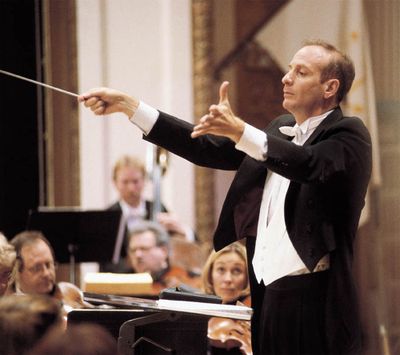Rachleff will lead weekend concerts

Larry Rachleff watched Leonard Bernstein’s Young People’s Concerts on television when he was growing up.
As an adult, he has followed Bernstein’s model into conducting and education.
Guest conductor Rachleff will lead the Spokane Symphony in a pair of concerts Saturday and Sunday at the Martin Woldson Theater at The Fox.
Orchestral works on the program include Hector Berlioz’s “Le Corsaire” Overture and Johannes Brahms’ Symphony No. 2.
Rachleff’s wife, soprano Susan Lorette Dunn, will sing six of Joseph Canteloube’s “Chants d’Auvergne.”
“It was probably Bernstein that turned my thoughts toward conducting,” Rachleff said in a telephone interview from his home in Houston. “But it was really my great joy in making music with other people when I was in college caused me to make it a career.”
Rachleff grew up in Connecticut and received his bachelor’s degree at the University of Connecticut. After spending summers at Colorado’s Aspen Festival, he went to the University of Michigan for graduate study.
Now in his 13th season as music director of the Rhode Island Philharmonic, he was music director of the San Antonio Symphony in Texas for five years and has been guest conductor of numerous orchestras from Australia to Poland.
Rachleff also heads the conducting program at Rice University’s Shepherd School of Music in Houston and previously held a similar position at Oberlin College-Conservatory in Ohio, where he directed the school’s contemporary music ensemble.
“I’ve been lucky to have been able to keep my feet in both the professional conducting world and the world of academe without getting my toes stepped on too often,” he says.
“Helping other musicians learn to conduct has been a kind of purifying experience for my own conducting.”
Though his Spokane appearance will feature works from the standard repertoire, Rachleff is a strong advocate for contemporary music.
Recent Rhode Island Philharmonic concerts included new works by Jennifer Higdon and the American premiere of the “Barracuda Concerto,” written for Evelyn Glennie by Dutch composer Jacob TerVeldhuis.
The major work on this weekend’s program is Brahms’ Symphony No. 2.
“Brahms’ Second is, for me, a perfect masterpiece with just the right combination of tradition and adventure, which made it a strong influence on many symphonies written later such as those of Dvorak,” Rachleff says.
“I think Brahms captures in a more direct way what he was trying to do in his First Symphony,” he says. “He spent half a lifetime working towards his First Symphony, but the Second seems a more fluid experience for him.
“The first movement has the wistfulness, the tonal beauty, the nostalgia – all those things we love about Brahms. And that’s just in the first six bars. And the finale is Brahms’ own ‘Ode to Joy’ in many ways.”
Rachleff met Dunn when he was conducting in Australia, where she had established a career as an opera and orchestral soloist.
Dunn came to the U.S. on a Winston Churchill Fellowship and worked with the New York Festival of Song. In 2007 she began her own company, Songfest.
Like Rachleff, Dunn teaches at Rice, and the couple live in Houston with their young son Sam.
The Canteloube songs she will perform here “are mostly shepherds singing to shepherdesses or vice-versa,” Rachleff says.
“Canteloube collected folk songs all over France, but he was mostly interested in those from his home region in the Auvergne,” he says.
“He was like Bartók and Kodaly in Hungary or Grainger and Vaughn Williams in England . They all went out with their recording machines and notepads taking down folk music and then devoted a lifetime to making use of those songs – or melodies like those songs and dances – in their concert music.”
Rachleff opens the weekend’s concerts with an overture that Berlioz eventually called “Le Corsaire,” though it went though a number of name changes on its way toward completion.
“It’s a very virtuosic romp that keeps everybody perspiring,” Rachleff says. “It is the typical Berlioz mixture of passion gone awry and wild orchestration.
“But it’s a work you don’t hear so often as, say, ‘The Roman Carnival,’ Even though Berlioz is a familar name, I think ‘Le Corsaire’ will start the program with a fresh touch.”
Rachleff will discuss the music on this weekend’s program one hour before each performance as a part of the symphony’s Gladys Brooks Pre-Concert Talks series.